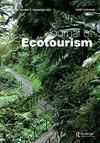Environmental justice, well-being and sustainable tourism in protected area management
IF 2.4
Q2 HOSPITALITY, LEISURE, SPORT & TOURISM
引用次数: 4
Abstract
ABSTRACT Research on ecosystem service trade-off, environmental justice and equity has grown during the last years as significant approaches to effectively connect use and conservation. Although there are justice tourism studies there are many aspects related to environmental justice that have not been addressed. We develop a framework to analyze social feedbacks in tourism – people’s cognitive and behavioral responses to change- to promote a more just environmental governance. Spatial analysis and methods of measuring environmental justice and well-being were applied in Bahía de San Antonio Protected Natural Area in Argentina. The results revealed the existence of two-way relationships and social feedbacks between tourism and conservation. We conclude that linking approaches related to environmental justice and well-being with tourism can provide theoretical insights to promote positive social feedbacks and to highlight pathways to reconcile tourism activity with protected areas management. These could be a first step to develop more sustainable forms of tourism in protected areas.保护区管理中的环境正义、福祉和可持续旅游业
近年来,生态系统服务权衡、环境正义与公平的研究日益成为有效连接生态系统利用与保护的重要途径。虽然有司法旅游研究,但与环境正义有关的许多方面尚未得到解决。我们开发了一个框架来分析旅游业中的社会反馈——人们对变化的认知和行为反应——以促进更公正的环境治理。在阿根廷Bahía de San Antonio自然保护区应用了空间分析和测量环境正义和福祉的方法。结果表明,旅游与自然保护之间存在双向关系和社会反馈。我们的结论是,将与环境正义和福祉相关的方法与旅游联系起来可以提供理论见解,以促进积极的社会反馈,并突出协调旅游活动与保护区管理的途径。这可能是在保护区开发更可持续的旅游形式的第一步。
本文章由计算机程序翻译,如有差异,请以英文原文为准。
求助全文
约1分钟内获得全文
求助全文
来源期刊

Journal of Ecotourism
Social Sciences-Geography, Planning and Development
CiteScore
6.40
自引率
12.50%
发文量
32
期刊介绍:
The Journal of Ecotourism seeks to advance the field by examining the social, economic, and ecological aspects of ecotourism at a number of scales, and including regions from around the world. Journal of Ecotourism welcomes conceptual, theoretical, and empirical research, particularly where it contributes to the dissemination of new ideas and models of ecotourism planning, development, management, and good practice. While the focus of the journal rests on a type of tourism based principally on natural history - along with other associated features of the man-land nexus - it will consider papers which investigate ecotourism as part of a broader nature based tourism, as well as those works which compare or contrast ecotourism/ists with other forms of tourism/ists.
 求助内容:
求助内容: 应助结果提醒方式:
应助结果提醒方式:


